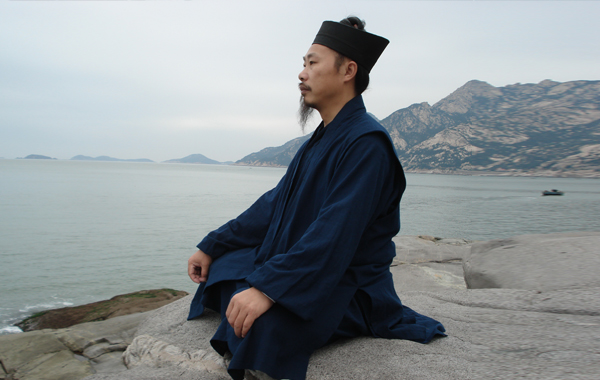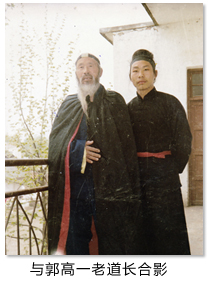wudang master
Brief Introduction to Taoist Master Zhong Yunlong

Taoist Master Zhong Yunlong, secular name Zhong Daozhu, Taoist name Qingwei, sobriquet Yunlong, is one of the first ordained Taoist clerics after Wudang Mountain opened to the public. He is the 14th - generation grand disciple of the Wudang Sanfeng School and a direct descendant of Wudang martial arts.
Early Life and Martial Arts Journey
At 18, driven by the pursuit of higher martial arts realms, he heeded guidance, bid farewell to his parents and mentor, and headed to the world - renowned Shaolin Temple in Songshan, Henan, to practice Shaolin boxing.
In Chinese martial arts, the saying "Respect Wudang in the South, Revere Shaolin in the North" holds that internal martial arts surpass Shaolin, with their birthplace at Wudang Mountain in Hubei. This legend deeply fascinated Zhong Yunlong, who cherished martial arts and pursued excellence. At 19, he set foot on the mysterious Taoist holy land of Wudang Mountain step by step.
Dedication to Wudang Martial Arts and Taoism
Due to his integrity, diligence, and solid martial arts foundation, he quickly gained the respect of his fellow disciples at Wudang. He also received guidance from Wang Guangde, President of the Wudang Taoist Association, and two senior Taoist masters, Zhu Chengde (then Qigong coach of the Association) and Guo Gaoyi (then martial arts coach of the Association).
Journey of Exploration and Competition
In winter 1985, he met Taoist Master Chen from Gansu at Nanyue, Hunan, learning the complete Wudang Baxian (Eight Immortals) School martial arts.
In 1986, he studied under Taoist Master Kuang Changxiu at Laoshan, Shandong, mastering the complete Wudang Northern School Xuanzhen (Mysterious Truth) School martial arts.
In 1987, he followed Taoist Master Liu at Zhongnan Mountain, Shaanxi, learning the complete Wudang Bagua (Eight Trigrams) School martial arts.
In summer 1987, during the "First Wudang Martial Arts Competition" hosted by Wudang Mountain, Taoist Master Zhong returned as a key member of the Wudang Taoist Association's martial arts team, representing Wudang Taoism for the first time and achieving excellent results. During training, he was fortunate to learn Northern School Xinyi (Mind - Intention) Boxing from Professor Shang Ji of Xi'an University, a disciple of Xinyi School master Ma Litang. After the competition, he visited martial arts master Huang Wanxiang in Jiangsu, learning You Shen Bagua (Wandering Body Eight Trigrams) and Southern School Xinyi boxing and weapons.
In 1988, he was again ordered to represent Wudang at the "First National Peasant Martial Arts Games" and succeeded Guo Gaoyi as the "Chief Martial Arts Coach of the Wudang Taoist Association." That year, when Qiao Shi, then Chairman of the Standing Committee of the National People's Congress, inspected Wudang Mountain, Taoist Master Zhong performed Wudang martial arts, receiving high praise: "Wudang martial arts are a treasure of Oriental culture and should be carried forward."
Promoting Wudang Martial Arts Globally
In spring 1994, as a representative of Wudang martial arts, he accompanied the Wudang Taoist Dharma Promotion Group on the first official visit to Taiwan, performing Wudang kung fu and ensuring the group's security. That year, Zhang Yaoting, President of the National Wushu Academy, inspected Wudang and wrote the inscription "Teach Arts, Impart Tao" after watching a special performance by Taoist Master Zhong.
In spring 1996, invited by Singaporean martial arts colleagues, he led a team to perform Wudang kung fu in Singapore, taking Wudang martial arts abroad for the first time. When Wu Sha 祖,then Director of the State Physical Culture and Sports Commission, visited Wudang, he praised: "Wudang boxing combines hardness and softness, Tai Chi flows like clouds—excellent, excellent, excellent!"
National Recognition and Global Influence
From 1995 to 2000, he served as Director of the Foreign Reception Office of the Wudang Taoist Association, Receptionist of Zixiao Palace, and Director of the Zixiao Palace Management Committee, overseeing reception and management. In 2001, he resigned from all administrative positions to focus on promoting Wudang martial arts, developing the Wudang Taoist Martial Arts School into the "Wudang Taoist Martial Arts Academy."
In 2002, invited by organizations like the China - US Cultural Exchange Association, he led a team to the US, introducing Wudang martial arts to the West for the first time and being received by UN official Klodija Verensija. Since 2003, he has been designated as the image master of Wudang martial arts by the Shiyan and Wudang Mountain governments, serving as Chief Martial Arts Coach of the Wudang Kung Fu Troupe, and has been a government - subsidized inheritor of Wudang martial arts since 2007.
Reemergence and Institutional Development
In 2009 - 2010, invited to train Wudang martial arts coaches, he recognized society's demand for health culture and the shortage of coaches, deciding to reemerge. In May 2010, he founded the "Wudang Sanfeng School Association," established the "Sanfeng Guild Hall" in August, and launched free martial arts coach training in September, cultivating elite talents through five - year closed - door training.
Honors and Legacy
2012: Named "One of the Most Influential Figures in Shiyan City over 30 Years"; awarded "Most Influential Tai Chi Master in the 21st Century" by the World Wushu Union.
2014: Awarded the "Outstanding Contribution Talent Award" by the Wudang Mountain Special Zone Government.
For over 30 years, he has participated in numerous domestic and international martial arts exchanges, accepted challenges from martial artists, visited countries like those in Southeast Asia, Europe, and the US, and received state leaders and international figures. His disciples span over 40 countries and all provinces in China.
Media coverage includes CCTV programs (e.g., Sports World, Exploration and Discovery), regional TV stations, and documentaries. He has appeared on variety shows, contributed to Wudang promotional films, spoken at TEDxShanghai, and been featured on the covers of over a dozen influential magazines, including Kung Fu & Qigong (US).
Taoist Master Zhong Yunlong has made enormous contributions to excavating, organizing, inheriting, and promoting Wudang martial arts and health - preservation culture, standing as one of the most influential figures in domestic and international martial arts circles.


